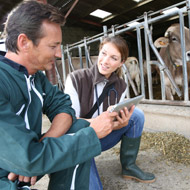
Scheme recognises farmers who set up biosecurity control measures
A new cattle health scheme to help farmers across England and Wales avoid the effects of bovine TB has launched in Bristol.
The CHeCS bTB Herd Accreditation is a voluntary scheme that evaluates risk and recognises farmers who set up biosecurity control measures.
Run by the Cattle Health Certification Standards (CHeCS), the scheme aims to improve a herd’s ‘score’ every year it is free from a bTB breakdown, awarding a status of 0-10.
It requires the herd vet and cattle owner to work together on following a host of biosecurity measures already implemented in other cattle disease control programmes.
Besides reducing infection risk, the CHeCS says the programme could benefit farmers selling cattle from regions with a high risk of TB, or those who wish to minimise exposure from bought-in animals.
It may also give recognition for a farmer’s efforts to complement government and industry strategies to control infection, they add.
Welcoming the scheme, farming minister George Eustice said: “We know some 40 per cent of herds in the high-risk area in England have never had a breakdown, and the CHeCS scheme will help them to communicate this so they can carry out risk-based trading to support their business.
“The scheme will also recognise those practising good biosecurity, which is a core part of our long-term plan to tackle bovine TB.”
Cabinet secretary, Lesley Griffith continued: “This industry-led initiative aimed at reducing TB is to be welcomed and fits in without principles of working in partnership and promoting the benefits of disease prevention.
“I urge Welsh farmers to engage with the scheme and reduce the risk of disease being introduced into their herd.”
The CHeCS scheme complements the government’s 25-year plan to eradicate Bovine TB in England.
Farmers wishing to take part are advised to discuss joining with their vet before contacting one of the participating CHeCS-accredited health schemes listed at www.checs.co.uk.



 The Animal and Plant Health Agency (APHA) has updated its online reporting service for dead wild birds.
The Animal and Plant Health Agency (APHA) has updated its online reporting service for dead wild birds.